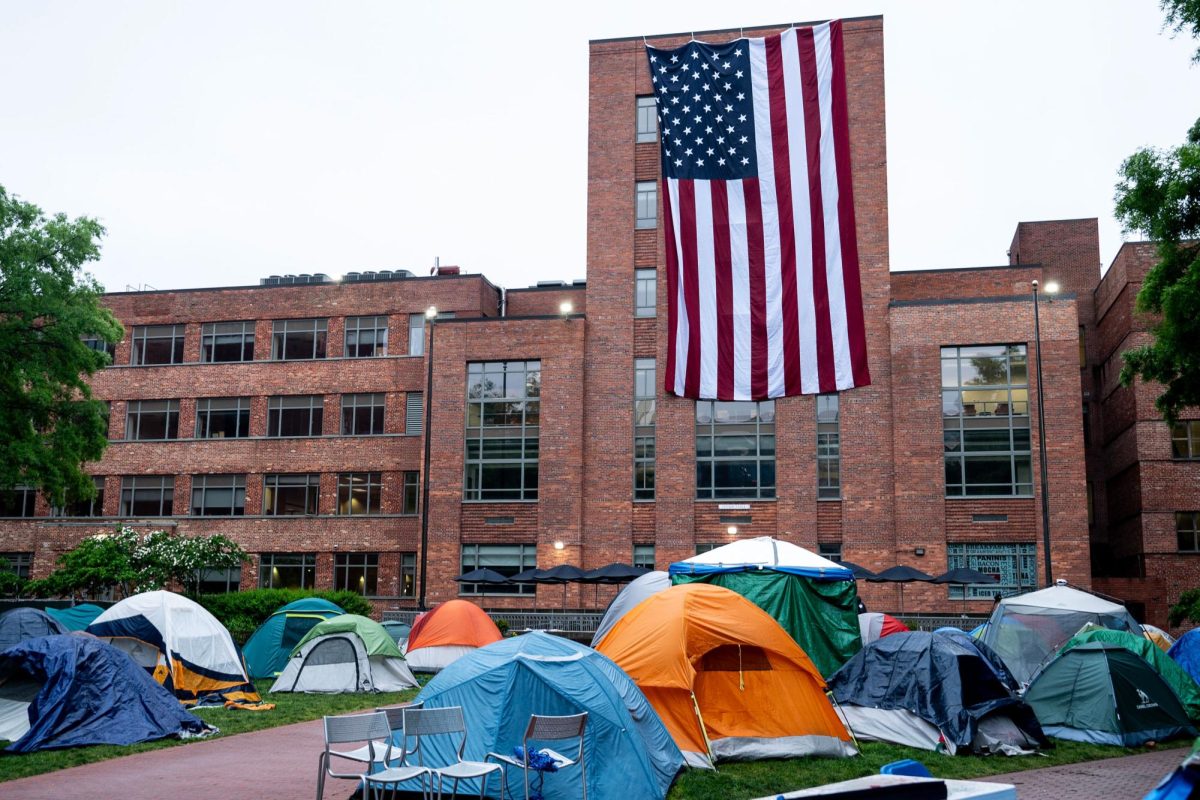Updated April 4, 2013, 2:11 p.m.
Two gay seniors who said they felt alienated by the Newman Center’s controversial priest will launch a campaign this week to force him off campus.
At least a dozen students, including seniors Damian Legacy and Blake Bergen, say they have left the Newman Center in the last several years because Father Greg Shaffer’s strong anti-gay and anti-abortion views are too polarizing. Shaffer, a Roman Catholic priest, has spent five years preaching to GW students.
The former Newman Center members are creating a video with testimony from 10 other Catholic students, who cite Shaffer as the reason they left the chapel, hoping to inflame a largely liberal campus and force University administrators to act. Legacy and Bergen also plan to file a formal complaint with the University and hold prayer vigils outside the Newman Center until Shaffer is removed.
The students lambasted Shaffer’s counseling sessions, in which he said he advises students who are attracted to members of the same sex to remain celibate for the rest of their lives. They also criticized the priest for a fiery blog post he wrote last May, calling gay relationships “unnatural and immoral” after President Barack Obama came out in support of same-sex marriage.
“We have to appeal to him. In the end, he’s the one preaching on Sunday. He’s the one counseling these students,” Legacy said. “The money doesn’t matter to him, but when you see the faces of the people you’re turning away, you see the people who say ‘Oh, I would go to church all the time, but I don’t like Father Greg.’ When you meet them at their level, that’s going to hit them harder because it’s something they’re going to understand.”
Legacy and Bergen will deliver a letter this week to top administrators including University President Steven Knapp, citing academic studies that link harmful psychological effects, like the inability to sleep and loss of appetite, with being around homophobic behavior.
GW’s Office for Diversity and Inclusion is already reviewing the case, after Legacy submitted a report last semester that outlined how other schools vet religious leaders before bringing them to campus.
New York University approves all religious affiliates by reviewing backgrounds, credentials and letters of recommendation from the faith community, as well as qualifications that indicate they can work with college-aged students. Legacy said GW would benefit from a similar system.
Vice Provost for Diversity and Inclusion Terri Harris Reed declined to comment on specifics about the report, saying that her office is in the “early stages of a review” of the Multicultural Student Services Center, which oversees religious life, “so it is premature to speak about the possibility or feasibility of any changes.”
Aside from the appeal to GW, Legacy and Bergen will also send letters to D.C.’s Roman Catholic archdiocese, who heads the Church for the entire District and is responsible for choosing priests’ assignments.
Legacy will also ask the Student Association to defund the Newman Center as part of the SA’s annual allocations process to organizations April 15. This year, the Newman Center received $10,000 from the SA, which divvies up funds from a budget accumulated through student fees.
Earlier this semester, the SA Senate passed a bill that allows the finance committee to dock a third of a group’s budget if the University finds a group is discriminatory or harasses individuals. The GW Catholics – based out of the Newman Center – have not been found to be either, but Legacy and Bergen said the bill could bolster their argument.
‘Religious rights’
The Newman Center, while affiliated with GW, is officially a part of the Roman Catholic Church. The GW Catholics is the largest Catholic student group on campus.
While students attend the Newman Center, the University does not have control over any religious outposts on campus.
Reed said “the university response to formal complaints depends on the specific allegations,” adding that GW supports the LGBT community.
“GW strives to maintain a community where individuals’ are free to express their religious beliefs and also respect the rights of others who have differing beliefs,” Reed said. “GW also supports free speech and takes seriously the role a university should play in encouraging expression of many points of view, even those we dislike or disagree with.”
And Shaffer said he has religious freedom and freedom of speech on his side, calling them “important rights that play a vital role at a diverse university like GW.”
‘A battle for my soul’
During his freshman and sophomore years, Legacy spent nearly all his time outside of classes at the Newman Center, and regularly served the altar during mass. When Legacy called Shaffer in the middle of the night, he knew his spiritual adviser would answer.
But when Shaffer found out that Legacy was in a relationship with another male student, and he and Bergen were both running for leadership positions in Allied in Pride, they were shoved out. Legacy, then a sophomore, said he remembers Shaffer calling him wicked and faithless for being gay, and said it destroyed his “sense of self.”
“To have my faith leader view me that way, just because of one piece of the way that God made me, and to think that one part is responsible for the destruction of my human dignity, it just didn’t, I can’t even begin to describe the mental conflict that it creates,” Legacy said.
Legacy, who was on the path to Catholic priesthood, said Shaffer’s counseling and teachings, in which he indicated that Legacy was “intrinsically disordered” because he was gay, set him on an emotional rollercoaster for months.
One day, he would practice celibacy, and the next day, he denounced faith. He remembers at one point ripping the Vatican Flag down from over his bed and throwing his cross across his room.
“At the time, I thought it was a battle for my soul,” Legacy said, stuttering, losing words to continue.
And while Legacy said he is now more comfortable with both his sexuality and his religion, and has since become an ordained priest in the Old Catholic Church in October, he said he doesn’t want anyone else seeking Shaffer’s counseling to feel that same torment.
‘A second father, a big brother and a spiritual guide’
President of the GW Catholics Justyna Felusiak called the Newman Center an “accepting environment” and said Shaffer has been a key figure in each members’ college experience.
“He was there when I was at my best and worst and never failed to be fair and without judgment in his approach,” Felusiak said in an email.
Multiple members of the GW Catholics chose not to comment about their personal experiences with Shaffer, deferring to GW Catholics Vice President Joseph McHenry, who provided statements on behalf of the group.
Junior Chris Crawford said aside from his parents, no one has had “as positive an impact” on his life than Shaffer.
“Fr. Greg is like a second father, a big brother and a spiritual guide all wrapped into one. He has had an immensely positive impact on all of us at the Newman Center, and this campus would be much worse off without his comforting, loving presence,” Crawford said.
He said that he talks to Shaffer “about everything” and that Shaffer provides him with wisdom while still being open and honest.
‘It still affects you’
Bergen, who was raised Jewish but identifies as an agnostic, supported his friend on his spiritual journey to priesthood. After Legacy brought a bible to their first date, Bergen decided to learn as much as he could about Catholicism and developed a personal relationship with Shaffer along the way.
But almost two years later, he still gets chills when he recalls Shaffer reading a passage of the Bible to him: Romans 1:24-32. Shaffer said that because he was gay, the descriptions applied to him.
“They have become filled with every kind of wickedness, evil, greed and depravity…They are gossips, slanderers, God-haters, insolent, arrogant and boastful; they invent ways of doing evil; they disobey their parents; they have no understanding, no fidelity, no love, no mercy,” Bergen said, tearing while reading the passage Shaffer had read to him two years ago aloud.
“Although they know God’s righteous decree that those who do such things deserve death, they not only continue to do these very things but also approve of those who practice them,” he said.
Legacy said he has since forgiven Shaffer, but will always feel the mental scars.
“It still affects you. It’s still there. But as much of a hardship and as damaging as it was, I wouldn’t be here without it. That’s not to say it’s acceptable,” Legacy said. “It’s not. And if I can prevent it from happening to anyone else, I’m going to.”
This article was updated April 4, 2013 to reflect the following:
A previous version of this article stated that the Newman Center’s Father Greg Shaffer learned Damian Legacy was dating Blake Bergen and seeking an Allied in Pride leadership position. Legacy was not dating Bergen at the time, though they were friends. The Hatchet also referred to the Bible passage Romans 1:24-32 as Romans 24:32. We regret these errors.







